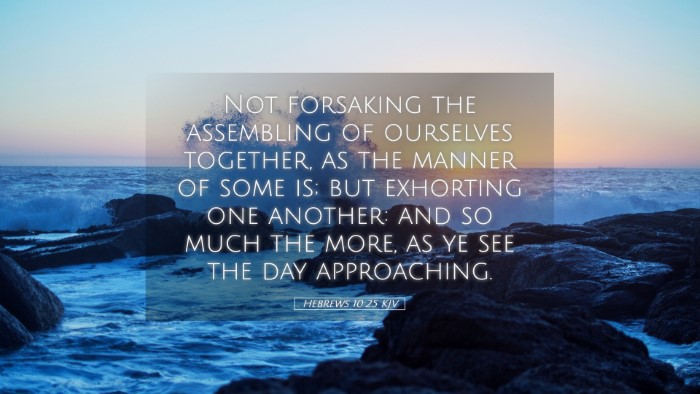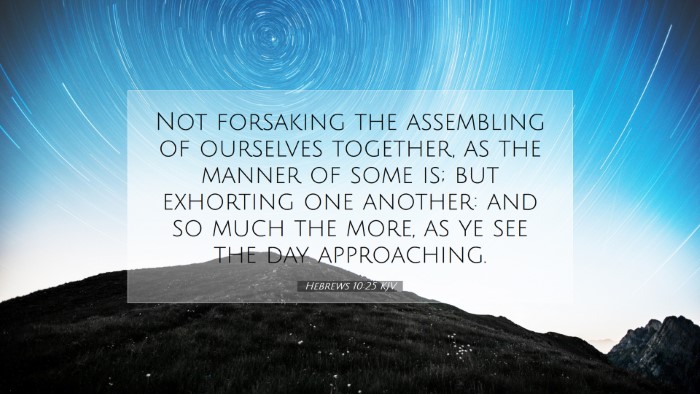Hebrews 10:25 Commentary
Hebrews 10:25 states: "Not forsaking the assembling of ourselves together, as the manner of some is; but exhorting one another: and so much the more, as ye see the day approaching." This verse serves as an essential exhortation for the Christian community regarding the importance of communal worship and mutual encouragement within the faith. Below is a comprehensive commentary based on insights from prominent public domain commentators.
General Overview
The Epistle to the Hebrews emphasizes the supremacy of Christ and the importance of faith in Him. The context leading to Hebrews 10:25 involves a warning against apostasy and the encouragement to hold fast to hope. Amidst persecution and trials, believers are called to support each other in faith. This verse highlights the importance of gathering together as a community of believers, reflecting on the nature and purpose of such gatherings.
Insights from Matthew Henry
Matthew Henry emphasizes the importance of the church as a body of believers coming together to worship and edify one another. He notes that:
- Collective Worship: Henry argues that public worship is instituted by God for His people and is essential for nurturing faith.
- Exhortation: He points out that mutual encouragement is critical, especially as believers perceive the approaching "day"—a reference to the return of Christ.
- Warnings Against Neglect: Henry warns that neglecting assembly not only harms the individual but also weakens the community, thereby diminishing collective faith and resilience.
Perspectives from Albert Barnes
Albert Barnes provides a deep exegesis on the significance of meeting together in a spiritual context:
- Obligation to Gather: Barnes argues that assembling is not merely a recommendation but an obligation for believers, fostering a culture where faith can thrive.
- Response to Persecution: He explains that during trials, community becomes vital for sustaining hope and courage, making meetings a source of spiritual strength.
- Connection to Apostolic Tradition: Barnes emphasizes that this practice has roots in the early church and should be preserved as a model for contemporary believers.
Reflections from Adam Clarke
Adam Clarke brings an interpretative lens that highlights the theological nuances of the verse:
- Spiritual Duty: Clarke asserts that forsaking the assembly constitutes a spiritual danger, potentially leading one toward a path of isolation and spiritual decline.
- Exhortation’s Role: He underscores the necessity of mutual exhortation, recognizing it as a divine means of grace among believers, particularly in the face of societal pressures.
- The Day Approaching: Clarke connects the phrase "as ye see the day approaching" with an eschatological urgency that calls believers to be vigilant and active in community life.
Practical Applications for Believers
The insights derived from these commentaries offer several practical applications for believers today:
- Commitment to Church Life: Believers are challenged to be actively engaged in their local churches, recognizing this involvement as both a privilege and a duty.
- Encouragement and Accountability: Regular assemblies foster opportunities for encouragement and accountability, essential components for spiritual growth.
- Awareness of Eschatology: The recognition of an impending day of judgment should motivate believers to maintain their faithfulness and promote communal worship.
Conclusion
Hebrews 10:25 encapsulates a vital principle of Christian life: the irreplaceable value of communal worship, encouragement, and steadfastness in faith. The reflections of Matthew Henry, Albert Barnes, and Adam Clarke compel believers to reflect on their commitment to the church, urging them to actively participate in gathering as a body of Christ, particularly in a world where individualism often threatens communal bonds. As the day approaches, the call remains clear—do not forsake the assembling of ourselves together.


